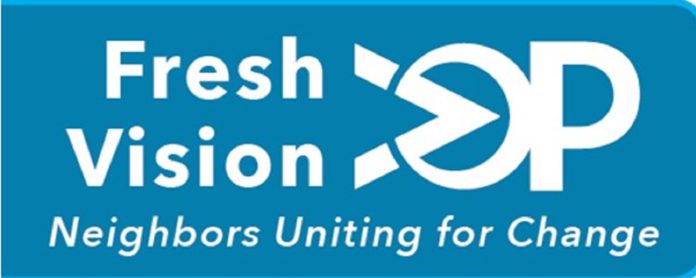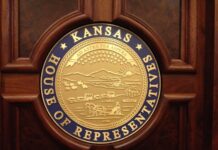The state ethics commission on Wednesday agreed to give a nonprofit group of Johnson County neighbors a rehearing after they questioned the legal credentials of the ethics commission’s executive director and set off a political firestorm at the statehouse.
The ethics commission refused to dismiss the case against Fresh Vision OP, which was found to be a political action committee last month and was required to disclose its donors under state campaign finance law.
The commission ordered a rehearing because the complaint lodged by Fresh Vision did not involve a substantive error that could not be remedied.
The case became the center of controversy after it led to an effort in the Kansas Senate to oust the ethics director when the group complained that he didn’t disclose that his law license had been suspended during their ethics hearing.
The effort to remove the ethics director opened the door to an ongoing ethics investigation, which revealed that subpoenas had been issued to a number of conservative politicians, strategists and groups, grabbing headlines across the state.
The ethics case alone has the promise of being a prolonged legal fight with the lawyers for Fresh Vision OP wanting to issue subpoenas and conduct full discovery, which could include a deposition of the commission’s executive director, Mark Skoglund.
Brett Berry, general counsel for the ethics commission, said he thought the idea of deposing Skoglund was “ridiculous” because his testimony is already set out in the record even though he wasn’t under oath.
Berry said he thought the commission should authorize any deposition of Skoglund and it should be limited to the ongoing ethics case and not any other matter.
“I fear my opposing counsel has ulterior motives for such a deposition,” Berry said.
Josh Ney, an attorney for Fresh Vision, immediately took issue with the Berry’s comment.
“He can take issue with my representation, but that is my concern and I am not at liberty to disclose why I may have that concern,” Berry said.
Ethics Commissioner John Solbach told Ney that the primary issue is centered on whether Fresh Vision is a political action committee and should reveal its donors.
“All we’re asking and all the law asks is that be disclosed. That’s the only issue here,” Solbach said.
“You’re proposing something that I think is going to be very expensive for someone, not for us, but for someone and it may end up with the same result.
“I would urge you to counsel your client about the cost-benefit analysis of what you’re trying to propose instead of simply accepting the fact that you’re a PAC, doing the paperwork and being done with it,” Solbach said.
Berry said the issue of the status Skoglund’s license was irrelevant.
“There is no ethical duty to cure or correct a statement by another individual when it is not material to a case,” Berry said.
The next hearing may not be held for another two months since there will need to be what can best be described as a pre-trial conference to lay out how discovery in the ethics case will be carried out.
Fresh Vision OP is incorporated as a social welfare group under 501(c)(4) of the federal tax code, meaning that it’s exempt from disclosing its donors and expenses under federal campaign finance law but not necessarily under state campaign finance law.
State law requires an organization to register as a PAC regardless of its tax status if its major purpose is to spend or contribute money for the nomination, election or defeat of a clearly identified candidate for state or local office.
A complaint was brought against the group after it urged voters last year to vote for Overland Park City Councilman Faris Farassati for mayor.
The commission found that Fresh Vision came under the state campaign finance law because in two instances – on a mailer and on its website – it expressly endorsed Farassati’s candidacy for mayor during the 2021 primary for Overland Park mayor.
However, the group’s president, James Muir, and treasurer, Chengny Thao, said their organization was made up of neighbors whose major purpose was advocating for their community, not any particular candidate.
Represented themselves the first hearing, they told the commission, that opposed tolling on U.S. 69, new development at Overland Park’s arboretum and the use of rocky, oily material called chip seal that the city uses to preserve streets.
The group, however, wanted the case dismissed or a new hearing because Skoglund did not disclosing that his law license was suspended when he was identified during the hearing as a “licensed attorney.”
During the hearing on the complaint, the commission did not swear in Mark Skoglund – the chief witness in the case – because he was an attorney.
At one point during the hearing, Thao, questioned whether Skoglund was licensed to practice law.
Solbach, acting as the presiding officer during the hearing, said Skoglund was a licensed attorney who was answerable to the judicial disciplinary administrator.
The group notes in its petition that Skoglund’s law license had been suspended since 2015.
Skoglund, who has been executive director of the ethics commission since 2017, said he chose not to maintain the license because he wasn’t using it and the license is expensive to maintain.
Fresh Vision’s lawyers said Skoglund’s “misrepresentation” affected the integrity of the hearing and the group’s due process rights to present evidence, develop issues or identify issues for a later hearing.
“The procedural or due process violations of my clients’ rights outweigh any technical violation that might have been alleged,” Ney told the commission on Wednesday.
A law license is not required for the position and Carol Williams, the former longtime executive director of the commission, was not a licensed attorney.
The commission did not address Skoglund’s licensure during the open part of the hearing on Fresh Vision.
















